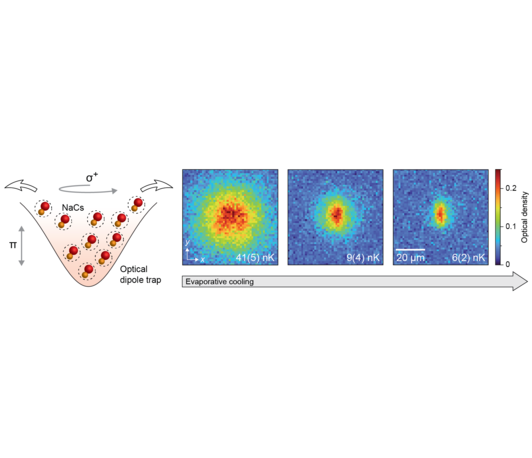“Creating and Exploring Bose-Einstein Condensates of Dipolar Molecules” (Prof. Sebastian Will)
- Datum: 21.01.2025
- Uhrzeit: 14:30
- Vortragende(r): Prof. Sebastian Will
- Columbia University, New York, USA
- Ort: Max Planck Institute of Quantum Optics, Hans-Kopferman-Straße 1, 85748 Garching
- Raum: Herbert Walther Lecture Hall

Recently, we have created the first BEC of dipolar molecules [1-3]. We evaporatively cool sodium-cesium molecules to below 10 nanokelvin, deep in the quantum degenerate regime. The BECs live for several seconds, reaching a stability similar to ultracold atomic gases. This dramatic improvement over previous attempts to cool molecular gases is enabled by collisional shielding via microwave fields, suppressing inelastic losses by four orders of magnitude. In this talk, I will discuss our experimental approach, share latest insights, and give an outlook on novel opportunities for many-body quantum physics, quantum
simulation, and quantum computing.
Figure: Evaporative cooling of NaCs molecules to BEC
References:
[1] Bigagli, Yuan, Zhang, et al., Observation of Bose-Einstein condensation of dipolar molecules, Nature 631, 289-293 (2024)
[2] Bigagli, et al., Collisionally stable gas of bosonic dipolar ground state molecules, Nature Physics 19, 1579-1584 (2023)
[3] Stevenson, et al., Ultracold gas of dipolar NaCs ground state molecules, Phys. Rev. Lett. 130, 113003 (2023)
Bio:
Sebastian Will is an associate professor of physics at Columbia University. His research focuses on ultracold atoms and molecules for applications in fundamental science, quantum simulation, quantum computing, and quantum networking.
Sebastian is the recipient of the Columbia RISE Award, the NSF Career Award, and the Sloan Fellowship. His research is supported by NSF, AFOSR, ARO, ONR, DOE, and the Gordon and Betty Moore Foundation.